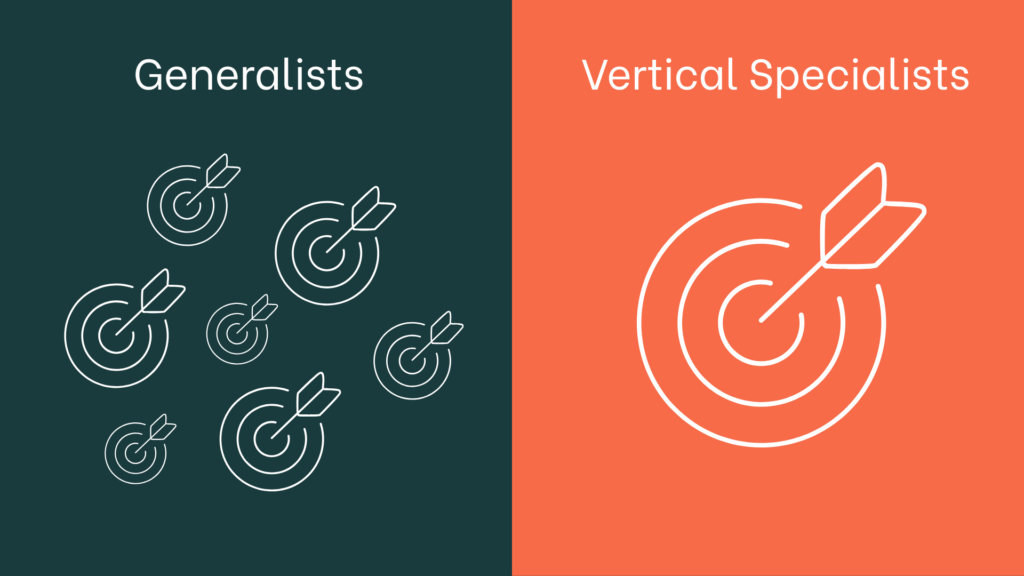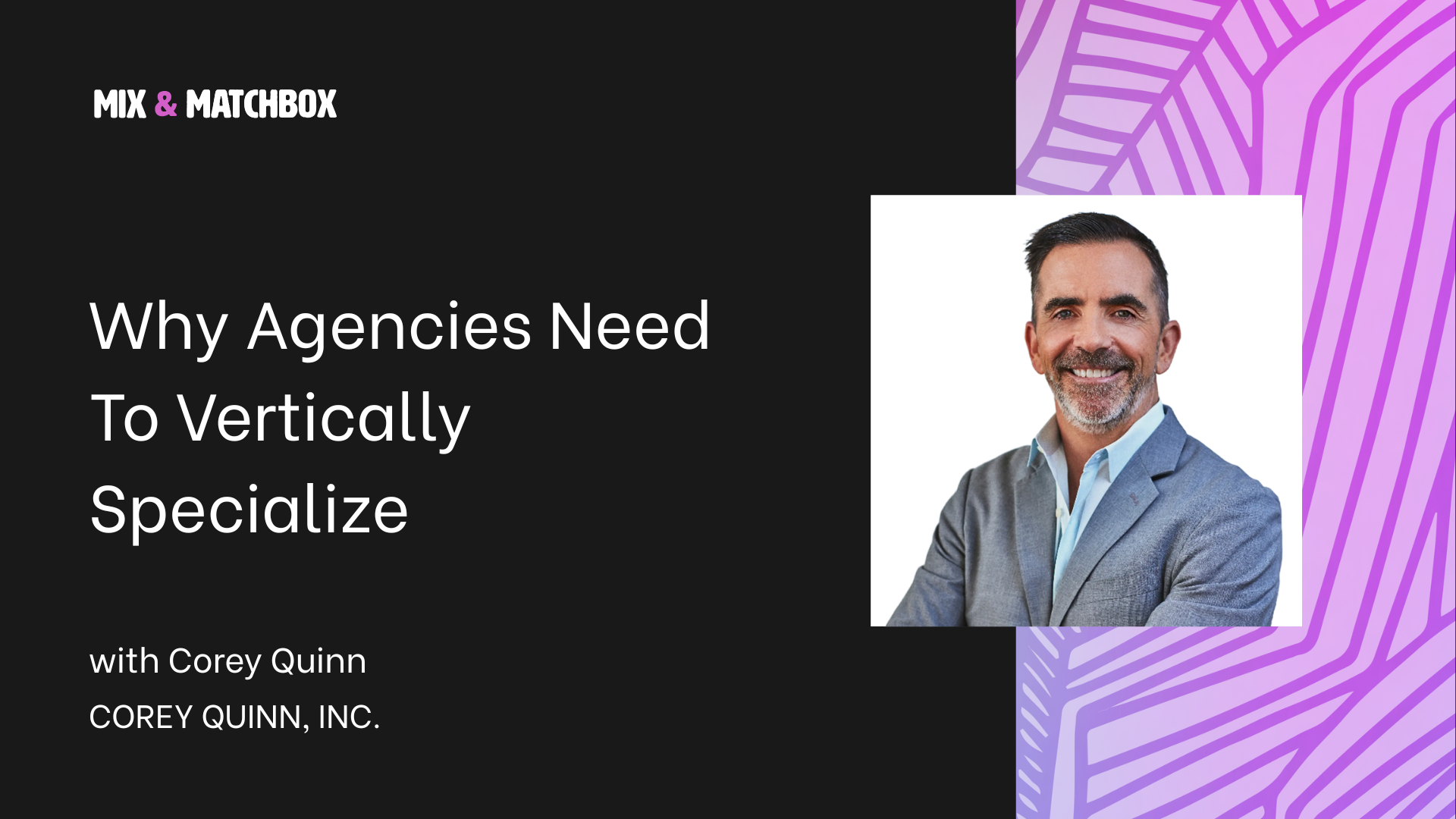Estimated reading time: 10 minutes
Mix & Matchbox Podcast – Episode 70
TL;DR: In this episode of Mix & Matchbox, Corey Quinn explains why vertical specialization is the key to scaling sustainably. By focusing on a defined niche, productizing services, and building a repeatable, founder-independent sales process, agencies can grow faster and with greater predictability. Corey also emphasizes the importance of owning your audience through email marketing, which provides a direct, reliable channel for nurturing leads and maintaining long-term relationships — unlike social platforms that can change overnight.
The Generalist Trap: How Agencies Get Stuck Trying to Be Everything to Everyone
Agencies are often tempted to be a “jack of all trades”, offering a wide range of services to attract as many potential clients as possible. After all, more clients means more revenue, right? Unfortunately, this generalist approach often leads agencies straight into what Corey Quinn calls “the generalist trap.”
The generalist trap typically starts when an agency is first getting off the ground. The founder, often with a technical or sales background, begins by saying “yes” to any client that comes their way – building websites, running PPC campaigns, managing social media, and more. This initial influx of clients and revenue feels like a success, but it quickly leads to major operational challenges:
- Constant context switching: With so many different client types and service offerings, the agency is in a perpetual state of context switching. The team is never able to truly specialize or become experts in any one area.
- The founder as bottleneck: As the agency grows, the founder becomes the sole person who understands the details of each client engagement. This makes the founder an irreplaceable bottleneck, limiting the agency’s ability to scale.
- Commoditized, low-quality work: With all the context switching, the agency’s work becomes increasingly commoditized. Clients perceive the services as interchangeable, leading to high churn and a race to the bottom on pricing.
- Chasing revenue, not growth: Facing high churn and overhead costs, the agency is forced to constantly chase new revenue, taking on any client that comes their way. This becomes a vicious cycle of unsustainable growth.
Corey Quinn has seen this pattern play out time and time again with the agencies he works with. As he explains, the root cause is a psychological bias that “more equals more” – the belief that by serving a wider range of clients, the agency will be more successful. But the reality is the opposite: agencies that vertically specialize grow 50 times faster and with more certainty than generalist firms.

The Power of Vertical Specialization
So why does vertical specialization work so well for agencies? There are a few key reasons:
1) Allows a Team to Develop True Expertise
When an agency focuses on serving a specific industry or vertical, they’re able to develop deep, specialized expertise in that domain. Rather than dabbling in a wide range of services and client types, the team can invest in truly mastering the challenges, pain points, and best practices of their chosen niche.
As Corey puts it, this allows the agency to embody the “Bruce Lee philosophy” – being the person who has practiced “one kick a thousand times” rather than “a thousand kicks once.” With this level of expertise, the agency can provide significantly more value to their clients and position themselves as true thought leaders in their space.
2) It Helps to Streamline Operations and Processes
Vertical specialization also allows agencies to streamline their internal operations and workflows. Instead of constantly context switching between different client needs and service offerings, the team can develop standardized, repeatable systems for their niche.
This not only makes the agency more efficient, but it also enables them to more easily scale their business. With a proven, productized approach, the agency can bring on new team members and onboard new clients without the founder being a constant bottleneck.
3) Allows Agencies to Charge Premium Pricing
When an agency becomes the go-to expert in their vertical, they’re able to command premium pricing for their services. Clients are willing to pay more for the peace of mind that the agency understands their industry and proven results that come from working with a specialized provider.
This higher pricing, combined with operational efficiencies, allows the agency to be more profitable and sustainable in the long run. It’s a win-win for both the agency and their clients!
Overcoming the Psychological Barrier to Specialization
Despite the clear benefits of vertical specialization, many agency owners still struggle to make the transition. Corey identifies a key psychological barrier that holds them back:
“There’s a common myth that narrowing your market will limit your success. In reality, agencies and service-based businesses that specialize in a specific vertical grow up to 50 times faster—and with far more certainty—than generalists.”
In other words, agency founders often fear that by narrowing their focus to a specific vertical, they’ll be leaving money on the table and limiting their growth potential. But as Corey’s experience shows, the opposite is true – specialization is the key to unlocking sustainable, scalable growth.
The challenge is that many agency owners don’t make the shift to specialization until they’ve tried “everything else a couple of times.” They’ll attempt to address the symptoms of the generalist trap (like high client churn or operational inefficiencies) through tactics like better employee training or optimized workflows. These solutions may serve as a temporary fix, but the deep rooted issues will remain. It’s like trimming the weeds without pulling out the roots — things might look better for a moment, but the same issues will keep growing back.
Corey’s advice? Don’t wait until you’re desperate to make the change. Proactively choose a vertical that aligns with your team’s expertise and the needs of your target market. Then commit to becoming the absolute best in that space.

How to Build a Founder-Independent Sales Process
One of the biggest hurdles agency owners face when transitioning to a vertically specialized model is letting go of founder-led sales. As Corey explains, many agency founders believe that “no one can sell like the owner”, and they struggle to hand off the sales function to their team.
The key, according to Corey, is to build a proven, repeatable sales process that isn’t dependent on the founder’s personal charisma or relationships.
This means:
- Productizing your offerings: Rather than customizing every deal, the agency should have a defined set of service packages and pricing tiers that sales reps can easily present to prospects.
- Developing a systematic sales playbook: The agency should have a documented, step-by-step sales process that new reps can be trained on and execute consistently.
- Empowering the sales team: Reps should have the autonomy to close deals within the parameters of the agency’s productized offerings, without needing constant founder approval.
- Building their own book of business: Sales reps can cultivate relationships and close deals directly within the vertical specialization. This remove the need to get every lead vetted by leadership first, which often creates bottlenecks and can ruin the momentum of a sale.
Corey shares a cautionary tale of one of his clients who made the mistake of simply hiring an experienced sales pro without having these systems in place first. The new salesperson ended up floundering for 6 months, unable to effectively sell the agency’s services. The founder eventually had to step back in, realizing that a proven, founder-independent sales process was the missing piece.
By taking the time to build that process upfront, agencies can successfully transition sales to a dedicated team. This frees up the founder, allowing them to focus on higher-level strategy and growth initiatives.
| Aspect | Founder-Led Sales Process | Rep-Led Sales Process |
|---|---|---|
| Sales Ownership | The founder handles most (or all) sales conversations, relying on personal relationships and charisma. | Dedicated sales reps own the process and can close deals independently within the defined framework. |
| Approach to Offerings | Highly customized for each client; SOWs are created on the fly. | Productized service packages and pricing tiers make the sales process repeatable and scalable. |
| Sales Process | Informal and personality-driven, often living “in the founder’s head.” | Documented, step-by-step sales playbook that any trained rep can follow consistently. |
| Decision-Making | Every lead or proposal must be reviewed and approved by the founder, creating bottlenecks. | Reps are empowered to qualify leads and close within established parameters—no constant founder oversight required. |
| Market Focus | Broad and unfocused, chasing opportunities across multiple industries. | Deeply focused within a specific vertical, allowing reps to build credibility and relationships in a defined niche. |
| Scalability | Limited — growth depends on the founder’s time and capacity. | Highly scalable — processes and systems enable a team to sell effectively without founder involvement. |
| Pipeline Building | Founder’s personal network is the primary source of leads. | Reps build their own book of business through targeted outreach within the vertical. |
| Founder’s Role | In the trenches, managing day-to-day sales and client acquisition. | Focused on leadership, strategy, and agency growth while the sales team drives revenue. |
| Risk | High — if the founder steps back, sales momentum often collapses. | Lower — a proven, repeatable process ensures consistency even as the team grows or changes. |
Why Email is an Agency’s Secret Weapon
As agencies work to establish themselves as vertical specialists, Corey is a big proponent of using email as the centerpiece of their marketing strategy. He believes email is one of the most powerful channels for agencies to own their audience and build direct relationships with prospects and clients.
Corey points to the recent trend of celebrities launching their own email newsletters as evidence of email’s enduring value. Figures like Lil Jon, Matthew McConaughey, and Andrew Huberman are all leveraging email to create more intimate connections with their audiences, beyond just their social media or podcast presences.
“Email is one of the few channels where you truly own your audience. Platforms like LinkedIn or social media may let you build a following, but you’re really just renting that audience. No matter how much content you post or how big your reach gets, it’s not yours — but with email, it is.”
For agencies, this ability to own their audience through email is crucial. Rather than being beholden to the whims of social media algorithms or other fickle channels, the agency can cultivate a direct line of communication with their target audience. This allows them to more effectively nurture leads, cross-sell services, and maintain long-term relationships.
Corey’s advice for agencies is to make email their primary marketing focus, rather than trying to be active on every social platform or content channel. By doubling down on email and doing it exceptionally well, agencies can build a sustainable, scalable foundation for their vertical specialization strategy.

Putting It All Together: Corey’s Advice for Agencies
Based on his extensive experience working with agencies, Corey Quinn has a clear, actionable roadmap for how firms can escape the generalist trap and unlock sustainable, profitable growth:
Key Takeaways
- Choose a Vertical Specialization: Identify a specific industry, niche, or client type that aligns with your team’s expertise and the needs of your target market. Commit to becoming the absolute best in that space.
- Build a Proven, Productized Sales Process: Develop standardized service offerings, pricing, and a documented sales playbook that empowers your team to close deals without constant founder involvement.
- Make Email Your Marketing Centerpiece: Leverage email to build direct, owned relationships with your ideal clients. Use email as the foundation of your content and lead generation efforts.
- Streamline Operations and Workflows: With your vertical specialization and sales process in place, focus on optimizing your internal operations. Develop repeatable systems and eliminate unnecessary context switching.
- Continuously Reinvest in Expertise: Maintain your position as the go-to experts in your vertical by constantly investing in team training, industry research, and thought leadership content.
By following this roadmap, agencies can break free from the generalist trap and position themselves for rapid, sustainable growth. As Corey emphasizes, the “riches are in the niches” – and vertical specialization is the key to unlocking those riches.
Ready to get started? Grab a free copy of Corey’s audiobook “Anyone, Not Everyone” to dive deeper into his proven 5-step system for agency specialization.
Never Miss an Episode
Get more insights on design, marketing, and all things digital. Subscribe to our Mix & Matchbox YouTube channel and join the conversation.
Want to Be Featured?
We love connecting with fellow creatives, marketers, and industry pros. If you’d like to share your story or expertise on the Mix & Matchbox podcast, let’s chat.



